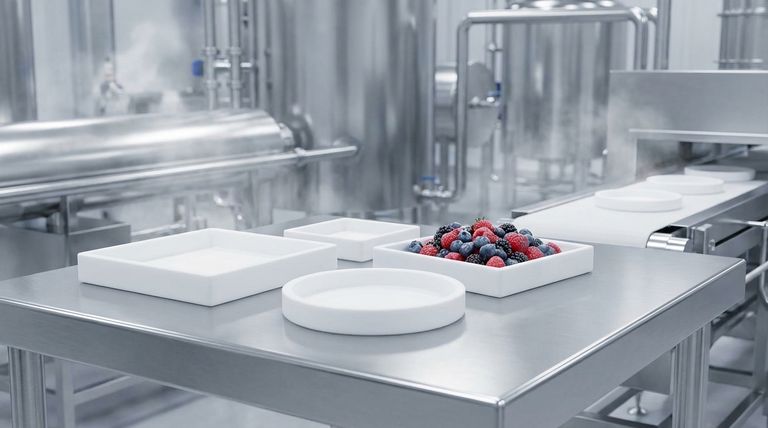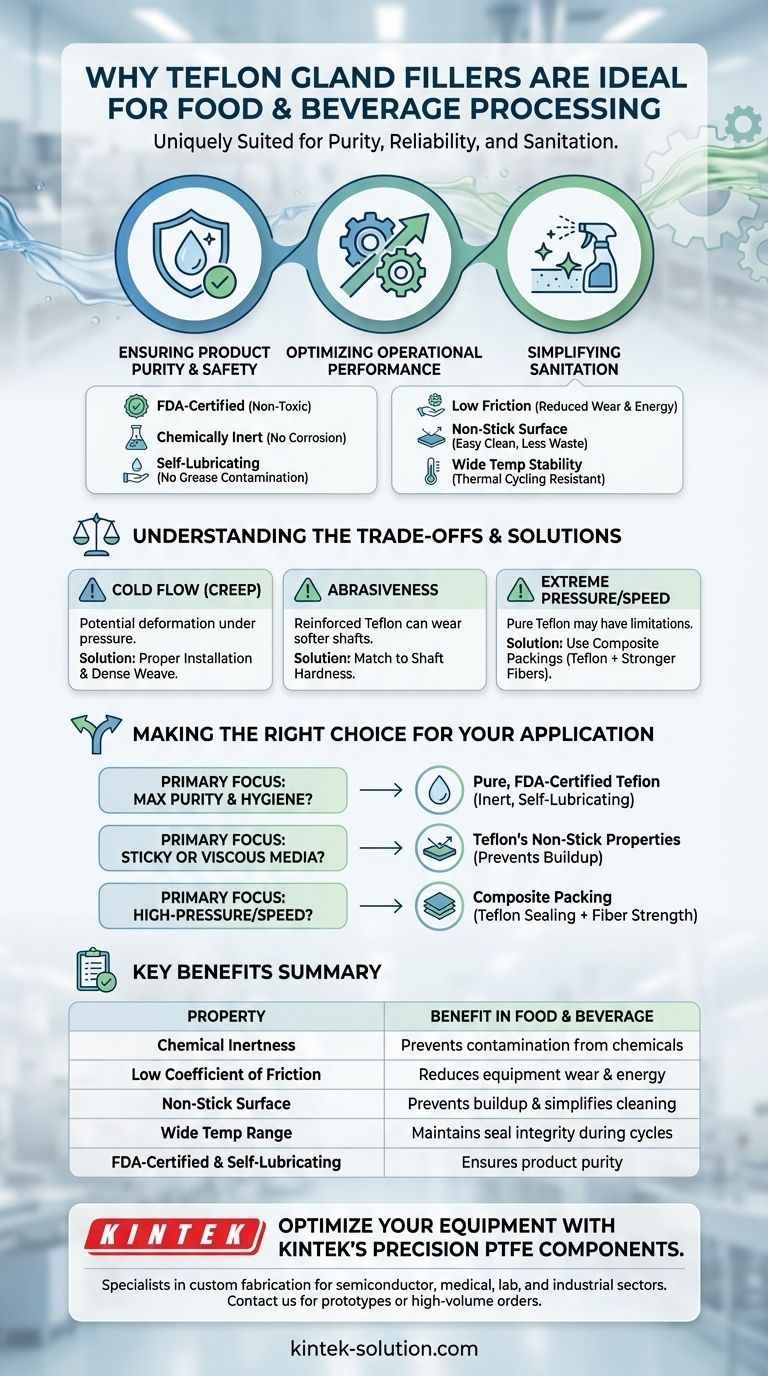In short, Teflon gland fillers are uniquely suited for food and beverage processing because they combine three critical properties: they are chemically inert and non-toxic, preventing product contamination; they have an extremely low coefficient of friction, protecting equipment; and they are highly resistant to the extreme temperatures and cleaning agents used in the industry.
The core reason for using Teflon (PTFE) goes beyond simply meeting food-grade standards. Its unique physical and chemical properties actively solve the industry's most pressing challenges: ensuring absolute product purity while simultaneously increasing equipment reliability and simplifying sanitation.

The Foundation: Ensuring Product Purity and Safety
In food and beverage applications, preventing contamination is the primary directive. Teflon's material composition is inherently designed to meet this need.
Certified Food-Grade Material
Teflon (PTFE) is widely recognized and certified as a food-grade material by regulatory bodies like the FDA. This certification guarantees that the material is non-toxic and will not leach harmful chemicals into the product.
This ensures that the final food or beverage product remains pure and safe for consumption, which is a non-negotiable requirement.
Chemical Inertness and Corrosion Resistance
Food and beverage products can be acidic (like juices) or alkaline, and processing often involves aggressive Clean-in-Place (CIP) and Sterilize-in-Place (SIP) chemicals.
Teflon is exceptionally chemically inert, meaning it does not react with these substances. This prevents both the degradation of the seal and the contamination of the product stream.
Eliminating Lubricant Contamination
Many traditional gland packings require external lubricants or greases to reduce friction on the pump shaft. These lubricants can become a source of contamination if they enter the product stream.
Teflon's self-lubricating nature allows it to operate without these external agents, eliminating a significant contamination risk and creating a cleaner, more hygienic sealing system.
Optimizing Operational Performance
Beyond safety, Teflon gland fillers provide tangible benefits that improve machine longevity, efficiency, and maintenance cycles.
Exceptionally Low Friction
Teflon has one of the lowest coefficients of friction of any solid material. For a gland filler in a pump or mixer, this is a significant advantage.
This low-friction surface reduces the energy needed to turn the shaft, minimizes heat generation, and dramatically reduces wear on expensive equipment components, leading to longer service life and lower operational costs.
Superior Anti-Adhesion (Non-Stick) Properties
Many food products, such as syrups, fats, chocolate, and doughs, are sticky and prone to building up on equipment surfaces.
Teflon's famous non-stick characteristic prevents this adhesion. This ensures a smoother flow of product, reduces waste, and makes equipment far easier and faster to clean and sanitize.
Wide Temperature Stability
Food and beverage processing often involves cycles of extreme heat (cooking, sterilization) and cold (flash freezing).
Teflon gland fillers maintain their integrity and sealing performance across a very wide temperature range. This stability prevents leaks and failures that could otherwise occur during thermal cycling.
Understanding the Trade-offs
While highly effective, Teflon is not a universal solution. Understanding its limitations is key to proper application.
Potential for Cold Flow
PTFE is a thermoplastic, and under sustained pressure, it can be prone to a phenomenon called "cold flow" or creep. This means the material can slowly deform over time, potentially leading to a loss of sealing pressure.
Proper installation techniques and using packings with a dense weave are critical to mitigate this effect and ensure a long-lasting, reliable seal.
Abrasiveness and Shaft Hardness
While pure PTFE has low friction, some reinforced Teflon packings (designed for higher pressures) can be abrasive to softer shaft materials.
It is important to match the specific grade of Teflon packing to the shaft's material and hardness to prevent premature wear on the shaft.
Performance Under Extreme Pressure
Pure, unreinforced Teflon packing may have limitations in very high-speed or high-pressure applications.
In these demanding scenarios, composite packings are often used. These combine Teflon's sealing and low-friction benefits with stronger materials like aramid or carbon fibers, which provide added structural strength and resistance to extrusion.
Making the Right Choice for Your Application
Selecting the right material requires aligning its properties with your primary operational goal.
- If your primary focus is maximum purity and hygiene: Pure, FDA-certified Teflon is ideal due to its inertness and ability to operate without contaminating lubricants.
- If your primary focus is handling sticky or viscous media: Teflon's non-stick properties are paramount for preventing buildup and simplifying cleaning.
- If your primary focus is high-pressure or high-speed service: Consider a composite packing that incorporates Teflon for its sealing properties and a stronger fiber for mechanical strength.
Ultimately, choosing Teflon is a decision that enhances product safety while directly contributing to more reliable and efficient plant operations.
Summary Table:
| Key Property | Benefit in Food & Beverage Processing |
|---|---|
| Chemical Inertness | Prevents contamination from acids, alkalis, and CIP/SIP chemicals |
| Low Coefficient of Friction | Reduces equipment wear and energy consumption |
| Non-Stick Surface | Prevents product buildup and simplifies cleaning |
| Wide Temperature Range | Maintains seal integrity during heating/cooling cycles |
| FDA-Certified & Self-Lubricating | Ensures product purity without external lubricants |
Optimize your food and beverage processing equipment with KINTEK's precision PTFE components.
As specialists in custom fabrication for the semiconductor, medical, laboratory, and industrial sectors, we understand the critical need for purity and reliability. Our Teflon gland fillers, seals, liners, and labware are manufactured to the highest standards, ensuring they meet the rigorous demands of your industry.
Whether you need prototypes or high-volume orders, our team is ready to deliver solutions that enhance your operational efficiency and product safety.
Contact KINTEK today to discuss your specific requirements and discover how our PTFE expertise can benefit your application.
Visual Guide

Related Products
- Custom PTFE Parts Manufacturer for Teflon Containers and Components
- Custom PTFE Parts Manufacturer for Teflon Parts and PTFE Tweezers
- Customizable PTFE Seals Filter Holders for Versatile Applications
- Custom PTFE Sealing Tapes for Industrial and High Tech Applications
- Custom PTFE Teflon Balls for Advanced Industrial Applications
People Also Ask
- What is the hardness range of PTFE on the Shore D scale? Leveraging Its Softness for Superior Performance
- How does PTFE compare to other low-friction plastics like UHMW-PE and Nylon? A Guide to Material Selection
- What is the temperature range that PTFE can withstand? From -200°C to +260°C for Demanding Applications
- What is the working temperature range of PTFE? Master Extreme Heat and Cryogenic Applications
- What are some applications of CNC machined PTFE parts? Critical Components for Medical, Electrical & Food Industries



















